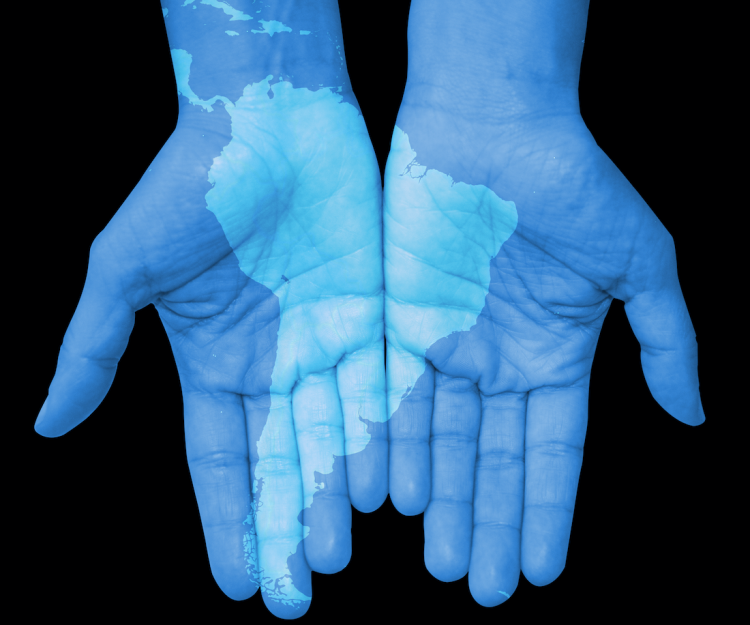The Meaning of the Word "America"

As a Latin American studying abroad, surrounded by U.S. students, I'm often struck by use of the word America. U.S. citizens often introduce themselves as "American". When I hear this, I wonder if it bothers Latin Americans, who are just as much "American" as they are.
I have come to realize that many don't understand the historic and symbolic meaning of the word "America". In one of my French classes, when we were asked to introduce ourselves to one another, one of my classmates said "Je viens d'Amérique, et toi?" (I come from America, you?) I answered with a confident "Moi aussi" (me too). Everyone in the class looked at me so confused, expecting me to say that I come from Ecuador. It took them a few seconds to realize that, in fact, I come from America too.
I have been wondering at what point the United States started being referred to as "America". And why so many associate America with a country — not with a continent.
Conquest of America, the "New World"
America, as we learned in high school, was named after the Italian explorer, Amerigo Vespucci. He was a navigator who wrote about his voyages to America in 1499 and 1502. Vespucci, unlike Christopher Columbus, knew that he had landed on a new continent. When geographers started making new maps of the world, they included the "new world" based on Vespucci's writings. When Vespucci landed in South America, the first maps turned recorded only that part of the continent. Later, as explorations continued, they added North America. A geographer of that era, Gerard Mercator, decided to keep the name America for both north and south continents.
Machu Picchu Image Credit: Wiki Commons
As I researched this history,, I realized that it's hard to pinpoint an exact moment when the image of what constitutes America today crystallized. John Adams, the second president of the United States, referred to his country as "America" in his first speech to the nation. From that moment, it seems, the rest of the world innocently started doing the same.
Where I grew up, in a small South American country, this monopolization of the word "America" doesn't seem so innocent. For me, it's the result of an imperialist nation that makes claim on greatness from a long trajectory of intruding in the business of other countries and, in the process, claimed the name of an entire continent as its own.
Carnaval in Rio de Janeiro Image Credit: Wiki Commons
Monroe Doctrine
In 1823 the United States adopted the Monroe Doctrine. President James Monroe declared that Europe could no longer try to control land in America (this time he referred to the entire continent). This happened while many Latin American countries had become, or were in the process of becoming, independent from Spanish rule. The United States, citing the Monroe Doctrine, would henceforth intervene if European nations interfered with any American country. Latin America was regarded as part of the United States sphere of influence.
Thus, the United States intervened in the conflict between Venezuela and Great Britain. In 1898, the U.S. went to war with Spain to defend Cuba from colonial rule, but then established rules of their own and their restrictions and control lasted until Castro's revolution. The US started gaining power, conquering territories like Nuevo Mexico, California, Arizona and more. In the end, the U.S. had control over Cuba, Puerto Rico, and the Philippines.
U.S. leaders spoke about unity for the entire continent and freedom from Europe's control. At that moment, South America fell under the control of a new conqueror, as it slowly — in the name of aid — took advantage of our resources and stripped us of our name. I sometimes wonder if they teach this history in the U.S. schools, or if we were are erased from their history books.
La Habana Image Credit: Wiki Commons
U.S. citizens' opinion
I remember one day in my high school English class when my teacher, a U.S. citizen, referred to the United States as "America". I raised my hand and said, "you mean United States". He answered with an irritated expression: "It's the same thing." This triggered a heated argument between my classmates and the teacher. He argued that the name has no impact, that it is only a name, finally saying that we should accept it because it won't change. Completely frustrated, I understood that he didn't care if America was the name of the continent too.
I found an article written by a U.S. citizen titled "I'm from America, stop complaining, South America." My reply to that is, of course we will complain, why wouldn't we? We were robbed of our name and now we've been forgotten after a series off historical events where the United States took advantage of our land and did it in name of a unified continent.
Now Donald Trump wants to build a wall, to keep us out. He wants to keep Americans outside of America while claiming that he will make "America great again". It sounds like a bad joke to me.
Dominican Republic Image Credit: Wiki Commons
Let's make America great again?
A beer brand, Corona replied to Trump's famous campaign slogan with a clever YouTube video copying the famous phrase but adding a question mark. The video quickly went viral. Every Latin-American I know was sharing it on Facebook.
We complain because a U.S. leader won the presidency using the name of an entire continent and inciting division. I just want the world to remember that America is, as pointed out in the video below, a land from north to south, multicultural, with beautiful landscapes and friendly people. America is already great.











